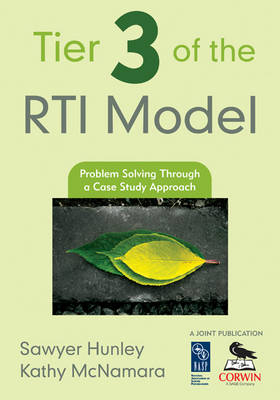
Tier 3 of the RTI Model
Corwin Press Inc (Verlag)
978-1-4129-5331-3 (ISBN)
"This book offers critical, practical, coherent, comprehensive, and research-based information for schools and districts implementing an RTI framework of intervention. It maps a seamless process of support that enables school psychologists and school teams to provide tiered interventions to increase student achievement."
—Jane Wagmeister, Director of Curriculum, Instruction, and Continuous Improvement, RTI Co-Chair Task Force
Ventura County Office of Education
Identify students′ learning needs and make appropriate decisions regarding instruction and intervention!
Response to Intervention (RTI) is a three-tiered framework that helps all students by providing targeted interventions at increasing levels of intensity. This detailed guide to tier 3 of the RTI model provides school psychologists and RTI teams with a case study approach to conducting intensive, comprehensive student evaluations.
With step-by-step guidelines for Grades K–12, this resource demonstrates how to develop a specific case study for students who are struggling in the general classroom. Focusing exclusively on the third tier, the book:
Provides guidance on problem identification and analysis, progress monitoring, selection of research-based interventions, and evaluation of case study outcomes
Addresses both academic and behavioral challenges, including mental health issues
Shows how school psychologists can collaborate with other members of the RTI team
Provides tools for assessment and for tracking progress
Tier 3 of the RTI Model guides school psychologists through the involved, in-depth process of building a case study that identifies student needs and helps educators determine the best way to educate students with learning challenges.
Sawyer Hunley is an associate professor, the coordinator of the School Psychology Program, and a Learning Teaching Fellow at the University of Dayton. She is chair of the National Certification Board for the National Association of School Psychologists, and was instrumental in revising the procedure for obtaining the National Credential of School Psychologists (NCSP). Hunley has served as a member of the Program Approval Board for the National Association of School Psychologists, and has participated in the writing of the last three revisions of the NASP Standards. Her professional and research interests include systems change for K-12 and higher education. Her publications and presentations have focused on the nature of the changing field of school psychology, data-based decision making, and the relationship between learning space and teaching/learning. She has over twenty years of experience as a school psychologist practitioner, supervisor, and faculty member. Kathy McNamara is a professor of psychology at Cleveland State University, where she directs the School Psychology Specialist degree program. She currently serves as chair of the Ethics and Professional Practices Committee of the National Association of School Psychologists, and has been active in the leadership of the Ohio School Psychologists Association since 1984. She has published chapters on social competence and professional ethics in the NASP Best Practices series. McNamara’s research focuses on intervention-based school psychological services, and her work in this area has been published in The School Psychology Review, the Journal of Educational and Psychological Consultation, and Exceptional Children. She has conducted numerous trainings of school psychologists, teachers, and administrators, and consults with school districts regarding implementation of the RTI model. McNamara has served for thirty years as a school psychologist practitioner, supervisor, and faculty member.
Preface
Acknowledgments
About the Authors
1. Introduction to RTI and the Case Study Model
Context and History
The Response to Intervention Process
The Case Study Model and Prereferral Intervention
Summary
2. Assessment Principles and Practices
Assessment Methods
Assessment at Tier 1
Assessment at Tier 2
Assessing Behavior
Summary
3. Facilitating Response to Intervention in Schools
School Psychologist as Systems Change Agent
Evaluating the System
Goal Setting
RTI Implementation
Summary
4. Problem Identification
Tier 1
Tier 2
Tier 3
Behavioral Definition of the Problem
Problem Certification: Establishing the Severity of the Discrepancy Between Actual and Expected Performance
Formulating Intervention Goals
Planning Data-Collection Activities for Baseline Measurement and Progress Monitoring
Assessment of Factors Related to the Problem
Summary
5. Problem Analysis
Generating Hypotheses
Primary and Secondary Dependent Variables
Types of Hypotheses
Intervention Selection
Hypothesis Testing
Summary
6. Single-Case Design
Single-Case Design and Hypothesis Testing
Single-Case Design and Progress Monitoring
Choosing a Single-Case Design
Summary
7. Intervention
Selecting Research-Based Interventions
Intervention Integrity
Linking Interventions to Hypotheses
Characteristics of Effective Academic Interventions
Characteristics of Effective Behavioral Interventions
Targets of Intervention
Summary
8. Evaluating Case Study Outcomes
Visual Analysis
Conducting Visual Analyses
Magnitude of Change
Choosing, Calculating, and Interpreting Effect Sizes
Quality of the Outcome: Goal-Attainment Scaling
Choosing Evaluation Methods and Judging Outcomes
Summary
9. Using the Case Study to Determine Special Education Eligibility
Disability Versus Eligibility Determination
Responsiveness Versus Resistance
Using Case Study Information for Special Education Eligibility Determination
RTI and Specific Learning Disabilities
Decision Making in Eligibility Determination
Technical Adequacy of Decision-Making Practices
Eligibility Decisions
Summary
10. Program Evaluation
Case Study Structure
Case Study Rubric
Case Study: Morgan
Case Study: Reggie
Evaluation of School Psychology Services and Programs
Case Study Fidelity
Intervention Integrity
Magnitude of Change
Goal-Attainment Scaling
Summary
References
Index
| Erscheint lt. Verlag | 29.12.2009 |
|---|---|
| Verlagsort | Thousand Oaks |
| Sprache | englisch |
| Maße | 177 x 254 mm |
| Gewicht | 470 g |
| Themenwelt | Sozialwissenschaften ► Pädagogik ► Sozialpädagogik |
| Sozialwissenschaften ► Soziologie | |
| ISBN-10 | 1-4129-5331-6 / 1412953316 |
| ISBN-13 | 978-1-4129-5331-3 / 9781412953313 |
| Zustand | Neuware |
| Haben Sie eine Frage zum Produkt? |
aus dem Bereich


